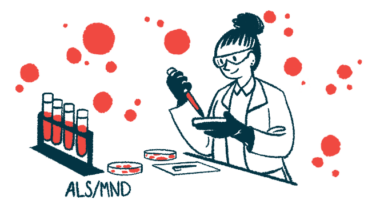Mabylon gets funding to advance human-derived antibodies for ALS
Antibodies have potential to restore normal TDP-43 protein function

The Swiss biotechnology company Mabylon has received two research grants from Target ALS and the ALS Association to support the development of human-derived antibodies that may help restore normal TDP-43 function in people with amyotrophic lateral sclerosis (ALS).
In nearly all ALS patients, nerve cells produce an abnormal version of the TDP-43 protein that is misfolded and prone to form toxic clumps that cause damage, driving the progression of the disease.
The funding, totaling CHF 500,000, or about $592,000, will be used to advance the development of TDP-43 intrabodies, which are produced by the patient’s own cells and target the abnormal protein inside cells. This contrasts with conventional antibodies, which are usually administered via regular infusions into the bloodstream and target proteins at the surface of cells.
A third grant from Innosuisse, the Swiss Innovation Agency, was also awarded to the company to advance another treatment program for inflammatory bowel disease. All grants will be used to fund studies in animal models that may support the start of clinical testing for the two programs.
“We are very grateful for these grants, which will help us achieve preclinical proof-of-concept for these two programs through research collaborations with renowned top experts,” Alcide Barberis, PhD, CEO of Mabylon, said in a company press release. “The goal is to then rapidly progress the programs into clinical development in partnership with biopharmaceutical companies or by creating an asset-specific spinoff with dedicated investments.”
TDP-43 involved in processing of messenger RNA
TDP-43 is normally found in the nucleus, the cellular compartment where genetic material is stored. There, it is involved in the processing of messenger RNA, an intermediary molecule that’s produced when DNA is read and is used as a template for protein production.
However, as a result of certain genetic mutations in ALS, TDP-43 is commonly misfolded and accumulates in the cytoplasm, the fluid that fills up cells outside the nucleus, where it forms toxic clumps that interfere with the function of nerve cells.
“TDP-43 aggregates are a hallmark of ALS and have emerged as a prime target for treating both familial and sporadic forms of the disease,” said Kuldip Dave, PhD, ALS Association’s senior vice president of research. “We are excited to support the continued preclinical development of Mabylon AG’s intrabody approach.”
The ALS Association grant came from its Lawrence and Isabel Barnett Drug Development Program, which funds projects transitioning from laboratory research to clinical development in an effort to bridge the gap between the discovery of promising therapeutics and industry development efforts.
Applicants should have already selected their lead candidate for clinical development, which should have a high probability to entering clinical testing within three years.
Getting promising treatments into clinical testing as quickly as possible
“Getting promising treatments out of the laboratory and into clinical testing as quickly as possible is key to making ALS a livable disease until we can cure it,” Dave said.
Mabylon is developing human-derived antibody therapies for ALS and several other conditions. Its approach is first to identify naturally occurring antibodies in patients that target disease-relevant proteins — TDP-43 in the ALS program. The selected antibodies are then produced in the lab in high amounts and tested for their therapeutic efficacy in preclinical models of the disease.
Human-derived antibodies have a higher therapeutic potential compared to antibodies derived from humanized animals or artificial libraries, according to the company.
“The foundation of our approach is the rapid identification of naturally occurring antibodies from large patient populations and/or immunized animals,“ said Niccolò Pengo, PhD, Mabylon’s chief scientific officer. “These grants clearly validate the quality of our research and the tremendous therapeutic potential of our approach.”








